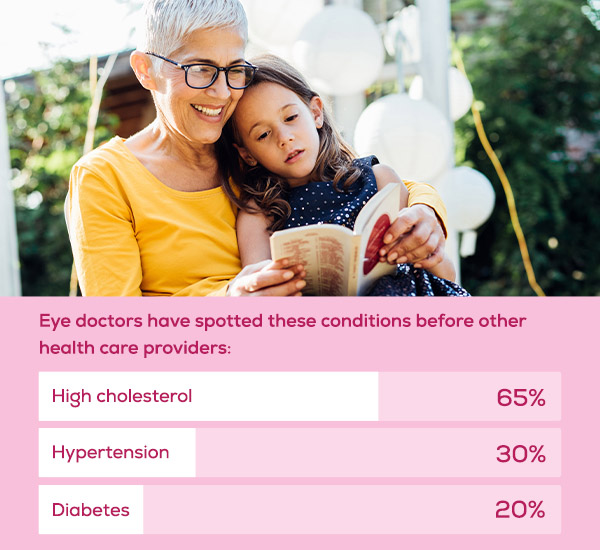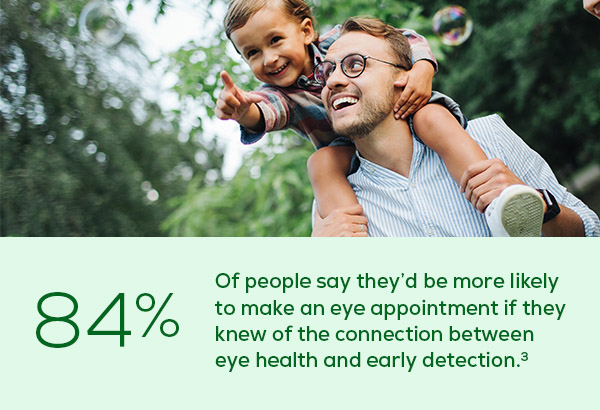In this 3-minute read you'll learn:
Ready to learn more about how vision care is preventative health care?

Keep the conversation going
Ready to learn about our unique approach to vision benefits? Chat with an EyeMed representatives and see how we make members smile. Let’s talk.
Did you know that the eye is the only place on the body with an unobstructed view of blood vessels?
More than a fun fact, it can be critical to employee health. With regular comprehensive eye exams, eye doctors can detect the early, and often subtle, signs of several high-risk health conditions.
Eye exams spot the signs
With a clear view of your eye, eye doctors can search for early signs of diabetes, hypertension, high cholesterol or serious eye diseases. Telltale hints of these diseases can be subtle early on, and early detection improves chances of a positive outcome.


Yet 2 out of 3 people don’t know that an eye doctor can detect these chronic health conditions.1 That’s why it’s important to promote eye exams as a tool for preventing and managing health issues.
Early detection changes outcomes
And here’s the good news - early detection improves the chances of a positive outcome, even with chronic conditions.2 If a chronic condition is found, eye doctors can refer patients to medical specialists, continue tracking and treating any eye-related issues, and in some cases, perform necessary eye surgery. And by understanding their condition, employees can seek treatment earlier and possibly improve their lives and their medical costs.


Not all vision screenings are created equal
In order to detect any underlying, chronic health conditions, it’s important to know the difference between an eye exam and a vision screening.
What is an eye exam?
A comprehensive eye exam is performed by a licensed optometrist or ophthalmologist with the equipment and training to identify and diagnose potential health problems or diseases. It’s the only way to ensure that any vision problems and other potential health issues may be detected.
How is an eye exam different from a vision screening?
A vision screening is like what employees might get at the DMV or health fair, or children might get at school. A screening is a simple test for acuity, distance vision and possibly eye coordination. But it can’t diagnose what’s going on and can be unreliable. Most of all, a screening can’t be relied on to detect health issues.
As preventive care, an annual eye exam is just as important as a physical or dental checkup. And sometimes it’s the only way to uncover serious diseases that may not show any early symptoms. That’s why we encourage everyone to get annual exams and why we strive to remove any obstacles getting in the way.
Ready to learn more about how vision care is preventative health care? Download our white paper.
Want to learn more about EyeMed vision benefits or request a quote? Speak with an EyeMed representative.
About Eyemed
EyeMed Vision Care is a leader in vision insurance benefits.4 We deliver stand-out vision benefits centered around an outstanding member experience as America’s largest vision network.5 EyeMed is based in Cincinnati, Ohio. Learn more at eyemed.com.
- Miller, S.; “Screen Time Takes Toll on Workers’ Eyes”; SHRM.org; February 2020.
- Fragala M., Shiffman D., Birse C.; “Population Health Screenings for the Prevention of Chronic Disease Progression”; American Journal of Managed Care; ajmc.com; November 2019.
- Turbert, D.; “Eye Exam and Vision Testing Basics”; (2018, Dec 17); American Academy of Ophthalmology; aao.org
- EyeMed internal book of business, 2023.
- Based on the EyeMed Insight network and analysis of competitors’ largest networks via competitor data, 2024.


